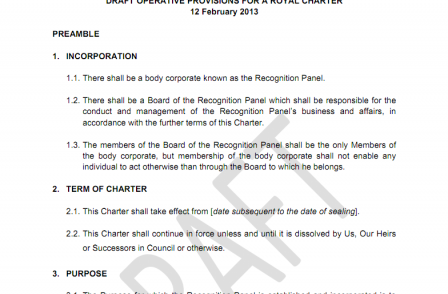
Culture Secretary Maria Miller's apparent admission that the controversial Royal Charter on press regulation will be 'redundant' if the industry's Independent Press Standards Organisation works has been widely interpreted as a breakthrough in the ongoing hostility between publishers and the Government.
Up to a point. But the law is still the law and if the industry's Court of Appeal challenge fails, the cross-party Royal Charter is something all journalists (in the list of approved publishers) will have to live with, like it or not.
Andrew Marr said: "If the press's system works the Royal Charter is redundant really because they have got their own system working."
Miller nodded her head, appeared to mouth the word yes and said "subject to them doing it".
The tenor of her interview was that the Government had no interest in forcing the press to join a Royal Charter-backed regulator via more legislation.
She may have been saying that she was relaxed about the IPSO regulator not being compliant with the Royal Charter if it proved to be effective anyway. But that doesn't change the fact that if publishers ignore the Royal Charter it could cost them dearly.
The Crime and Courts Act 2013 states that publishers who aren't members of a Royal Charter-backed press regulator will be subject to the threat of exemplary damages in libel and privacy cases. Lawyers have told Press Gazette that the chances of being stung with exemplary damages are exceptionally low so this may be a hollow threat – but we just don't know how judges are going to interpret the new legislation.
More worrying for publishers is another clause in the Crime and Courts Act 2013 which states:
If the defendant was a member of an approved regulator at the time when the claim was commenced (or was unable to be a member at that time for reasons beyond the defendant’s control or it would have been unreasonable in the circumstances for the defendant to have been a member at that time), the court must not award costs against the defendant unless satisfied that – (a) the issues raised by the claim could not have been resolved by using an arbitration scheme of the approved regulator, or (b) it is just and equitable in all the circumstances of the case to award costs against the defendant."
So in a nutshell, publishers could have to pay their own costs even if they win a libel action if they are not members of a Royal Charter-approved regulator.
And it is clear, for the reasons outlined by the Privy Council (mainly on independence), that IPSO does not comply with the cross-party Royal Charter on press regulation which was signed by the Queen last week.
If no publisher wants to sign up to a press regulator which is fully compliant with the Royal Charter (as currently seems to be the case) then it is doubtful that a rival regulator will be set up. If IPSO is the only game in town the costs provision of the Crime and Courts Act may not kick in (because under the wording above, it would not be reasonable to expect publishers to be members of a regulator which does not exist).
Reading the runes on all this, I think Miller is saying that the Government is washing its hands of this situation. It has created the legal framework for a new system of press regulation with the Crime and Courts Act's 'sticks' in place. If publishers choose to go it alone with IPSO and take their chances in the courts, that is up to them.
The major question-mark around IPSO lies with whether the Financial Times, Independent and Guardian will sign up to it. They all have concerns that IPSO is not independent enough from the press owners – The Guardian in particular fears that Telegraph Media Group, Associated Newspapers and News UK will have too much control over IPSO via the successor body to Pressbof, the Regulatory Funding Company.
Email pged@pressgazette.co.uk to point out mistakes, provide story tips or send in a letter for publication on our "Letters Page" blog
